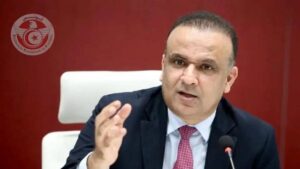Burkina Faso: The Prime Minister, Dr. Apollinaire Joachimson Kyélèm De Tambèla, Presides the Very First Session of the COSMCIU
The Prime Minister, Dr. Apollinaire Joachimson Kyélèm de Tambèla, chaired the very first session of the Committee for Strategic Orientation, Monitoring and Coherence of Identification Initiatives in Burkina Faso (COSMCIU), Wednesday, August 16, 2023 in Ouagadougou. While reiterating its readiness to support the implementation of the basic electronic unique identifier for persons in Burkina Faso, it urged those implementing the project to speed up and intensify their actions, with a view to achieving the expected results within the given timeframe.
As Chairman of the Committee for Strategic Orientation, Monitoring and Coherence of Identification Initiatives in Burkina Faso (COSMCIU), the Prime Minister, Dr. Apollinaire Joachimson Kyélèm de Tambèla, informed, during the work, that the implementation of a unique identifier in Burkina Faso is a project to which the Head of State, Captain Ibrahim Traoré, attaches great importance.
“It is a structuring and fundamental project of the Transition. At birth, a general unique identifier is given to the child, and as it evolves, it is referred to as a sectoral unique identifier. For example, if he starts a business and becomes a merchant, it will be referred to as a unique business identifier at the Tax level, and so on. The aim is to create a generic unique identifier for everyone, and as it evolves, more identifiers will be added. This will be used by the CENI for recruitment, the fight against crime, the fight against corruption, etc. This identifier will be used by many sectors. It’s really a huge amount of work that goes into this project,” he explained.
Moreover, he suggested taking into account the Burkinabé from abroad, but also foreigners of Burkinabé origin living in countries such as Ghana, Côte d’Ivoire, Sudan, etc…
In his opening remarks to the proceedings of this meeting, he argued that the government’s desire is to speed up the implementation of a unique electronic identifier for people in Burkina Faso, in a national context marked by security challenges and the need to reform our public intervention strategies.
« In this respect, digital technology offers innovative and effective solutions for planning and implementing socio-economic development and social protection measures. Our country began the implementation of the unique electronic identifier of the person in 2018, with the objective of ensuring the uniqueness of the individual and functional interoperability between the plurality of existing identification systems such as the Unique Identifier of the Citizen in the Civil Status (IUCEC), the Personal Identification Number (PIN) for the National Identity Cards of Burkina Faso (CNIB) and the Unique Financial Identifier (IFU) of companies and legal entities”, said- added.
In addition to ensuring the uniqueness of the individual, the Prime Minister, said, the unique identifier is a key tool for inclusive growth, as public services such as social safety nets, health, education, and businesses will be able to use it to identify and authenticate their beneficiaries and clients.
According to the chairman of the COSMCIU, the national process of establishing the unique identifier has been conducted in a participatory and inclusive way, through a wide consultation among the actors of the identification ecosystem.
“The national and endogenous initiative to create a national register of the unique electronic identifier of individuals has been taken over, from 2020, by the Single Identification Programme for Regional Integration and Inclusion in West Africa, known as WURI. As a technology for social development programme, it operates in six West African countries, including Burkina Faso, Côte d’Ivoire, Benin, Niger, Togo and Guinea, with financial support from the World Bank. Its development objective is to increase the number of people in participating countries who have a unique government-recognised ID that facilitates their access to basic social services,” he said.
In addition, he mentioned that, in a concrete way, this project carried by the COSMCIU aims to identify 100 million individuals in West Africa, or 27% of the population of the West African space, by 2028. In the specific case of Burkina Faso, and in line with the endogenous initiative in this area, it will be necessary to provide 85 percent of the population with a single electronic proof of identity recognized by the Government and facilitating their access to basic services by 2026.
For him, the government has placed the dematerialization of administrative procedures and acts at the heart of the reform of the state, for the benefit of citizens.In his view, this process brings our ambitions to improve the quality of public services, to increase their availability, to reduce long files in administrations and to reduce delays in issuing documents and services.
Emeka.OBIAKO






